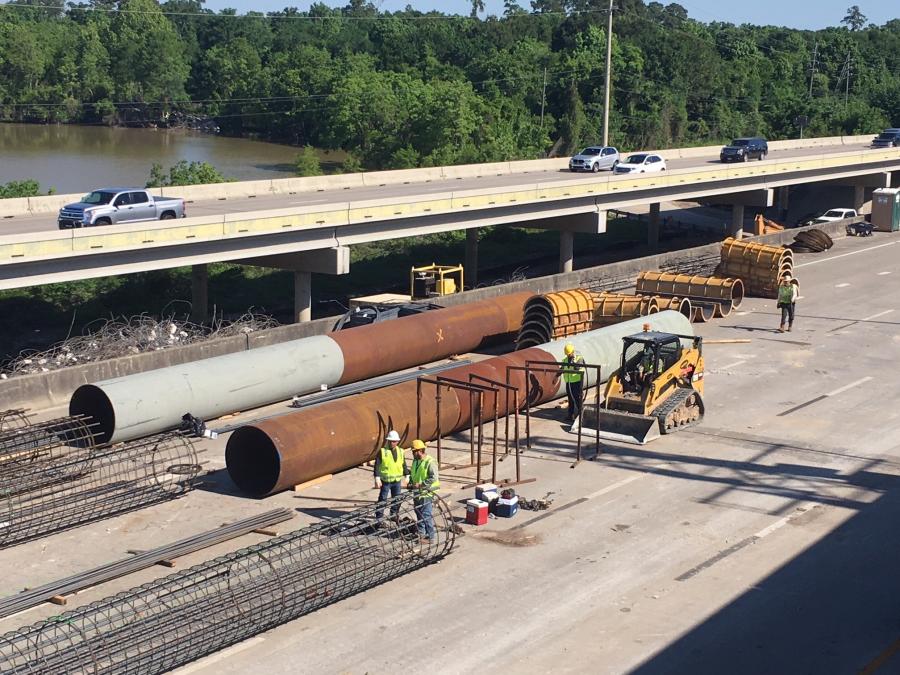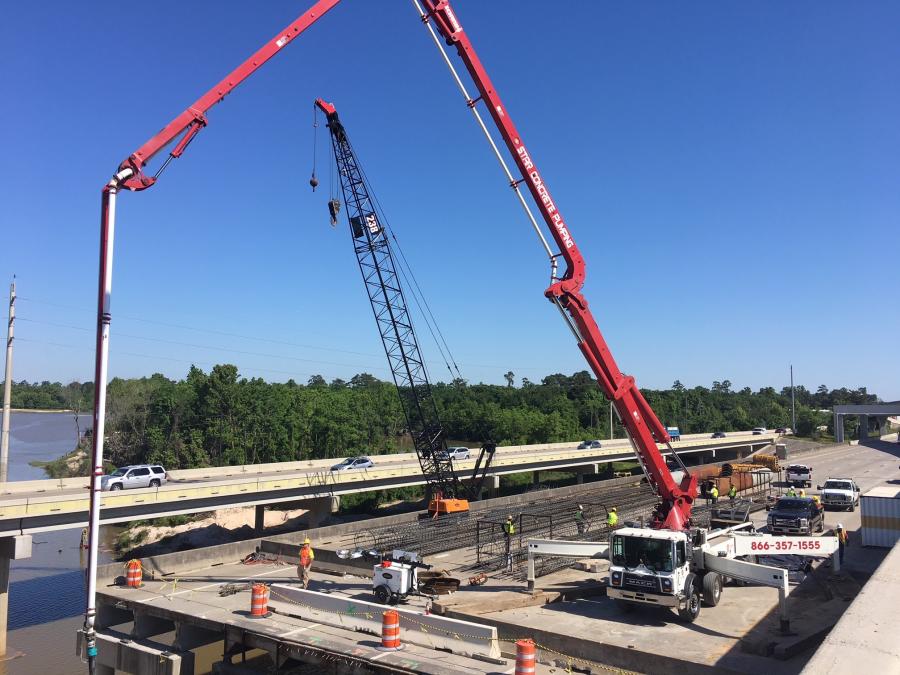The I-69 Eastex Southbound bridge over the San Jacinto River received substantial damage due to changes in the river.
Nearly nine months after Hurricane Harvey made landfall on the coast of Texas, prompting the largest disaster response ever recorded in Texas state history, work is at last under way to repair a bridge that suffered substantial damage in the storm.
The category four storm dropped nearly 4.5 ft. of rain with winds howling to 130 mph.
According to the Federal Emergency Management Agency (FEMA), “More than 19 trillion gallons of rainwater fell on parts of Texas, causing widespread, catastrophic flooding. Nearly 80,000 homes had at least 18 in. of floodwater, 23,000 of those with more than 5 ft. The Houston area experienced the largest amount of rainwater ever recorded in the continental United States from a single storm (51.88 in.). Twenty-four hospitals were evacuated; 61 communities lost drinking water capability; 23 ports were closed; and 781 roads were impassable. Nearly 780,000 Texans evacuated their homes. In the days after the storm, more than 42,000 Texans were housed temporarily in 692 shelters. Local, state and federal first responders rescued 122,331 people and 5,234 pets.”
Causing about $125 billion in damage, Harvey ranks as the second-most costly hurricane to hit the U.S. mainland since 1900.
“This is going to be a massive, massive cleanup process,” Texas Gov. Greg Abbott told “Good Morning America” Sept. 1, about a week after Harvey hit. “People need to understand this is not going to be a short-term project. This is going to be a multi-year project for Texas to be able to dig out of this catastrophe.”
 One of those projects is the I-69 Eastex Southbound bridge over the San Jacinto River. It received substantial damage due to changes in the river. Now, the Texas Department of Transportation (TxDOT) is on track to repair damage and get the bridge fully reopened. Crews have demolished multiple spans of the bridge and are in the process of rebuilding them. The work calls for rerouting the southbound mainlanes onto northbound mainlanes of the I-69 Eastex freeway prior to the bridge. This will allow motorists to bypass the southbound bridge closure. Southbound motorists will then return to the southbound mainlanes near the Townsen overpass.
One of those projects is the I-69 Eastex Southbound bridge over the San Jacinto River. It received substantial damage due to changes in the river. Now, the Texas Department of Transportation (TxDOT) is on track to repair damage and get the bridge fully reopened. Crews have demolished multiple spans of the bridge and are in the process of rebuilding them. The work calls for rerouting the southbound mainlanes onto northbound mainlanes of the I-69 Eastex freeway prior to the bridge. This will allow motorists to bypass the southbound bridge closure. Southbound motorists will then return to the southbound mainlanes near the Townsen overpass.
Construction Equipment Guide caught up with TxDOT spokesman Danny Perez to talk about the project.
CEG: When was the bridge built and how much damage did it receive?
TxDOT: The original structure was built around 1961. One side of the bridge was widened in about 1982. Twelve years later, in 1994, the other side also was widened.
During Hurricane Harvey, the main channel of the San Jacinto River shifted, impacting the I-69 southbound mainlanes bridge over the river. As a result, the depth and alignment of the river changed, affecting the foundation of the bridge.
Although capable of carrying typical traffic, the southbound bridge does not have the capability of carrying extremely heavy loads, which have been diverted to the frontage road. To restore the load carrying capacity of the southbound bridge, a project to replace the affected portion of the bridge has been awarded to Webber LLC Construction.
CEG: How much will repairs cost?
TxDOT: The project is anticipated to cost about $7.6 million.
CEG: What is the timeline for completion?
TxDOT: 182 Days with two milestones that have a maximum of 10 days of incentives each with unlimited disincentives for each.
CEG: What heavy equipment is on site?
TxDOT: The contractor is using various equipment resources, including barges, cranes, track hoes, hydraulic breakers, light plants and concrete pump trucks.
CEG: How will crews demolish the damaged spans?
TxDOT: The demo plan calls for the deck to be broken and removed, with barges below to capture the debris. The beams and girders were then lifted and removed via cranes and barges.
The caps and columns were supported while they were saw-cut and then removed intact. The footings will be broken after the new foundation is in place and the existing piling will either be cut off two feet minimum below the mud line or pulled and removed intact.
CEG: What is the biggest challenge in doing a job like this?
TxDOT: Working safely over a moving body of water is challenging. In addition, we know having this bridge reconstructed and back in service is very important to the community so getting it done quickly and efficiently is crucial.
CEG: How many workers on site?
TxDOT: The number of workers varies from day to day depending on the tasks at hand. The goal is to get the most work on any given day.
CEG: Will the new spans be prefabricated and delivered to the site, or built on site?
TxDOT: Concrete beams and panels will be cast off site and then set into place.
CEG
Lori Tobias
Lori Tobias is a journalist of more years than she cares to count, most recently as a staff writer for The Oregonian and previously as a columnist and features writer for the Rocky Mountain News. She is the author of the memoir, Storm Beat - A Journalist Reports from the Oregon Coast, and the novel Wander, winner of the Nancy Pearl Literary Award in 2017. She has freelanced for numerous publications, including The New York Times, The Denver Post, Alaska Airlines in-flight, Natural Home, Spotlight Germany, Vegetarian Times and the Miami Herald. She is an avid reader, enjoys kayaking, traveling and exploring the Oregon Coast where she lives with her husband Chan and rescue pups, Gus and Lily.
Read more from Lori Tobias here.
Today's top stories








 One of those projects is the I-69 Eastex Southbound bridge over the San Jacinto River. It received substantial damage due to changes in the river. Now, the Texas Department of Transportation (TxDOT) is on track to repair damage and get the bridge fully reopened. Crews have demolished multiple spans of the bridge and are in the process of rebuilding them. The work calls for rerouting the southbound mainlanes onto northbound mainlanes of the I-69 Eastex freeway prior to the bridge. This will allow motorists to bypass the southbound bridge closure. Southbound motorists will then return to the southbound mainlanes near the Townsen overpass.
One of those projects is the I-69 Eastex Southbound bridge over the San Jacinto River. It received substantial damage due to changes in the river. Now, the Texas Department of Transportation (TxDOT) is on track to repair damage and get the bridge fully reopened. Crews have demolished multiple spans of the bridge and are in the process of rebuilding them. The work calls for rerouting the southbound mainlanes onto northbound mainlanes of the I-69 Eastex freeway prior to the bridge. This will allow motorists to bypass the southbound bridge closure. Southbound motorists will then return to the southbound mainlanes near the Townsen overpass.






